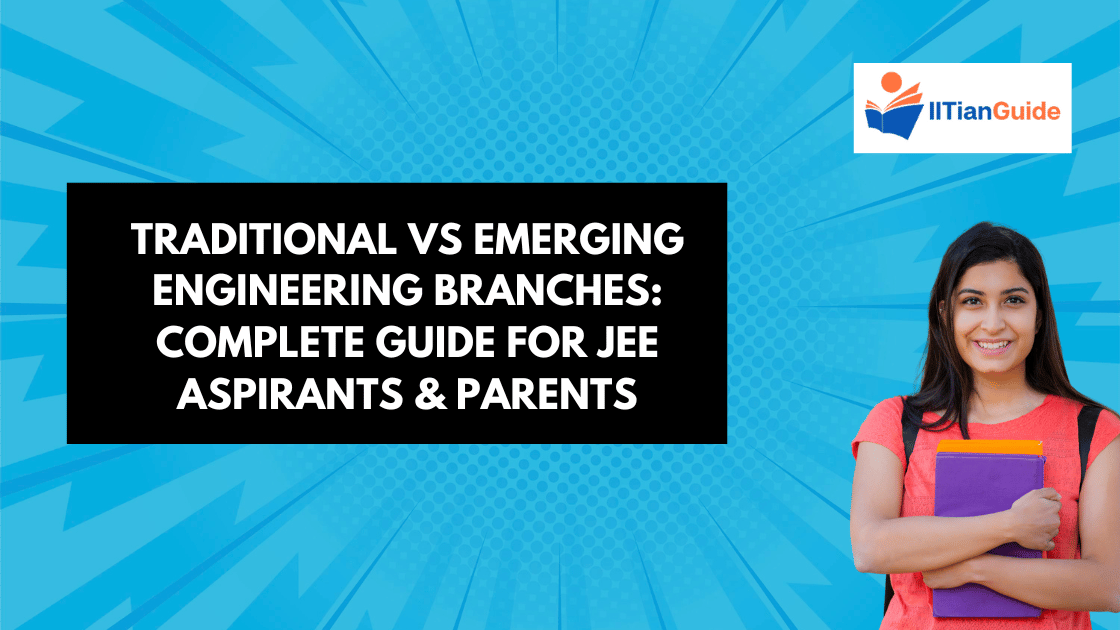Traditional vs Emerging Engineering Branches: Complete Guide for JEE Aspirants & Parents

For JEE aspirants and their parents, choosing between traditional engineering branches and emerging engineering branches is one of the most important decisions. While Mechanical, Civil, Electrical, and Chemical Engineering remain reliable choices, new branches such as Artificial Intelligence (AI), Data Science, and iBME (Instrumentation and Biomedical Engineering) are rising rapidly.
This blog explains both categories, compares their career prospects, and gives practical advice for making the right choice.
What are Traditional Engineering Branches?
Traditional engineering branches are the foundation of engineering education. They include:
- Mechanical Engineering
- Civil Engineering
- Electrical Engineering
- Chemical Engineering
- Electronics and Communication Engineering
These courses focus on core engineering principles like mechanics, thermodynamics, construction, power generation, and manufacturing.
Why they matter:
- Stable demand across industries like infrastructure, energy, transportation, and defence.
- Strong placement opportunities in both private and public sectors.
- Ideal for students who enjoy designing, building, and testing physical systems.
What are Emerging Engineering Branches?
Emerging engineering branches have appeared in response to technological advances and new global challenges. Examples include:
- AI Engineering (Artificial Intelligence)
- Data Science Engineering
- iBME (Instrumentation & Biomedical Engineering)
- Specialisations in Robotics, Cybersecurity, Mechatronics, and Biotechnology
These branches focus on future-ready skills like algorithms, machine learning, big data, biomedical devices, and smart systems.
Why they matter:
- High demand in technology, healthcare, and research industries.
- Attractive salaries and faster career growth.
- Opportunities to work in innovation-driven sectors such as AI startups, MedTech firms, and global IT companies.
Comparative Overview of Engineering Branches
|
Branch Type |
Examples |
Key Skills Developed |
Career Opportunities |
|
Traditional Engineering |
Mechanical, Civil, Electrical, Chemical |
Physics, design, thermodynamics, materials |
Manufacturing, construction, power, transport |
|
Emerging Engineering |
AI, Data Science, iBME, Robotics |
Algorithms, coding, data handling, biomedical devices |
Tech companies, healthcare technology, research, startups |
AI Engineering: The Future of Computing
AI Engineering is among the fastest-growing emerging engineering branches. Students learn machine learning, deep learning, neural networks, and natural language processing.
Career paths in AI Engineering:
- AI Engineer
- Machine Learning Specialist
- Robotics Developer
- Data Analyst
Top IITs and global universities now offer dedicated B.Tech in AI Engineering programmes, showing the rising demand for skilled graduates.
Data Science Engineering: The Power of Data
Data Science Engineering focuses on big data analytics, statistics, and computational models. Students gain expertise in Python, R, data visualisation, and predictive modelling.
Career paths in Data Science Engineering:
- Data Scientist
- Business Intelligence Analyst
- Data Engineer
- Financial Data Analyst
Almost every industry — finance, healthcare, retail, IT — now hires Data Science engineers, making it a lucrative choice.
iBME: Instrumentation & Biomedical Engineering
iBME (Instrumentation and Biomedical Engineering) blends electronics, instrumentation, and healthcare technology. It is designed for students interested in medical devices, sensors, and clinical technology.
Career paths in iBME:
- Biomedical Engineer
- Clinical Instrumentation Specialist
- Medical Device Designer
- Research Scientist in Health Tech
With the global push for medical innovation, iBME courses are gaining popularity among JEE aspirants.
How to Choose Between Traditional and Emerging Branches
When deciding between traditional engineering branches and emerging engineering branches, consider:
- Interest & Aptitude – Students good at coding and mathematics may excel in AI and Data Science, while those passionate about machines may prefer Mechanical Engineering.
- Career Goals – Emerging branches often offer faster growth in tech and healthcare, while traditional ones provide stability.
- Industry Demand – Look at placement records and internships offered by the college.
- Long-Term Relevance – Traditional branches are evergreen; emerging ones are high-growth but may evolve quickly.
Roadmap for JEE Aspirants to Enter Emerging Branches
- Build strong foundations in Mathematics, Physics, and Coding.
- Take part in online coding platforms and data science projects.
- Explore basic AI/ML projects during school.
- For iBME, consider summer internships in healthcare labs or with medical device companies.
- Shortlist colleges that explicitly offer Tech in AI, Data Science, or Biomedical Engineering.
Why Parents Should Pay Attention
Parents often focus only on rank and college, but the branch choice after JEE determines the career path. Parents should:
- Research emerging engineering branches before counselling.
- Guide children towards practical projects and skill-building.
- Compare colleges not just by reputation, but by curriculum, industry tie-ups, and placement history.
Conclusion
Traditional engineering branches such as Mechanical, Civil, and Electrical Engineering remain strong career choices with stable demand. However, emerging engineering branches like AI Engineering, Data Science Engineering, and iBME open doors to fast-growing industries with high earning potential.
The best choice depends on a student’s interest, aptitude, and long-term goals. Parents and JEE aspirants should carefully evaluate programmes, placement opportunities, and future growth before making a final decision.
Frequently Asked Questions (FAQs)
Q1. Which is better: Mechanical Engineering or AI Engineering?
Both are valuable. If a student enjoys machines and design, Mechanical Engineering is better. If they are passionate about coding and data, AI Engineering is a stronger choice.
Q2. Is Data Science a separate branch of engineering?
Yes. Many IITs and universities now offer B.Tech in Data Science, focusing entirely on statistics, algorithms, and big data applications.
Q3. What is iBME in engineering?
iBME (Instrumentation and Biomedical Engineering) is an interdisciplinary branch that combines electronics, biomedical technology, and instrumentation to design medical devices and healthcare systems.
Q4. Are traditional branches still relevant?
Yes. Mechanical, Civil, and Electrical Engineering remain essential for industries like infrastructure, power, and manufacturing.
Q5. Do emerging branches guarantee higher salaries?
Generally, graduates from AI, Data Science, and iBME find higher starting salaries, but long-term growth depends on skills, projects, and internships.

